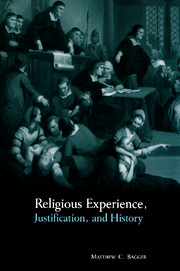Book contents
- Frontmatter
- Contents
- Acknowledgments
- List of abbreviations
- Chapter 1 Introduction: spectral evidences
- Chapter 2 The explanation in experience and the explanation of experience
- Chapter 3 Justification by reasons alone
- Chapter 4 Perennialism revisited
- Chapter 5 The miracle of minimal foundationalism
- Chapter 6 Loves noble Historie: Teresa of Avila's mystical theology
- Chapter 7 Modernity and its discontents
- Bibliography
- Index
Chapter 4 - Perennialism revisited
Published online by Cambridge University Press: 22 September 2009
- Frontmatter
- Contents
- Acknowledgments
- List of abbreviations
- Chapter 1 Introduction: spectral evidences
- Chapter 2 The explanation in experience and the explanation of experience
- Chapter 3 Justification by reasons alone
- Chapter 4 Perennialism revisited
- Chapter 5 The miracle of minimal foundationalism
- Chapter 6 Loves noble Historie: Teresa of Avila's mystical theology
- Chapter 7 Modernity and its discontents
- Bibliography
- Index
Summary
In chapter 2 I rehearsed, through a discussion of James, the common thesis that context mediates experience. This view, like any other, generates detractors. Recently Robert K. C. Forman has attempted to muster support for the existence of a form of experience peculiarly unaffected by prior beliefs, language or concepts. He takes the position that the specifically mystical experiences reported in the literature of many different religious traditions include an unmediated, and therefore non-context-relative or qualitatively identical, core. In this chapter I consider this challenge. To reopen the debate he has solicited essays from like-minded scholars for his book, The Problem of Pure Consciousness. Predictably, the focus of the volume rests on the refutation of the position most notably expounded in Steven Katz's influential article of 1978, “Language, Epistemology, and Mysticism.”
In that work Katz adopts a polemical tone to criticize a prevalent tendency in studies of mysticism. Many prominent works in the field embrace the mystics' claims about mystical experience which they assert provides some form of direct epistemological access to reality. Katz links this uncritical stance to ecumenically or dogmatically inspired attempts to conflate the cross-cultural varieties of mystical experience to one or a few general types. He refers to this method as “essentialist reductionism.” In its place Katz offers the thesis that “linguistic, social, historical, and conceptual contextuality” affects the mystic before, during and after the event to color or shape his experience.
- Type
- Chapter
- Information
- Religious Experience, Justification, and History , pp. 90 - 108Publisher: Cambridge University PressPrint publication year: 1999

